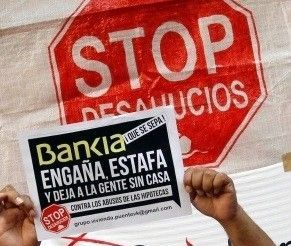Will The Russians Bail Out Cash-Strapped Cyprus In Lieu Of An EU Loan?
ANALYSIS

With all the hype surrounding the Spanish banking crisis and looming Greek elections, there is another, far more insidious bailout quietly creeping up on the EU.
Mediterranean minnow Cyprus is only days away, according to rumors, from requesting a bailout equivalent to 10 percent of its GDP.
The issue is urgent. We know the recapitalization of the (island's) banks must be completed by June 30, and there are a few days left, Finance Minister Vassos Shiarly recently told journalists.
Amid growing concern over the EU's larger members, financial storm clouds have been slowly gathering over the divided island state.
With massive exposure to Greece, Cyprus Popular Bank is in desperate need of roughly €2 billion in recapitalization.
On Tuesday, Moody's ratings agency put Popular on review for a downgrade and cut its credit rating for both the Bank of Cyprus and the country's third largest bank, Hellenic.
According to the Wall Street Journal, the government is also in need of an extra € 2.5 billion to € 3 billion loan to shore up its own depleted finances and meet the country's spending commitments for 2013 and 2014.
But while the €5 billion hole accounts for more than a quarter of the island's economy, it is minuscule in comparison to the debt burdens facing Greece, Italy, Spain or Ireland.
However, it is not the amount of money needed that should be scaring policymakers, but rather the parties from which Cyprus is likely to seek the cash from.
On the surface it would seem the only option is to approach the EU for money, like Ireland, Portugal, Greece and now Spain, have done, with all the harsh economic consequences that would entail.
However, unlike the other bailout recipients, Cyprus has another, far more attractive, option on the table.
For years, wealthy Russians have used Cyprus as an offshore banking haven, with expats pumping billions into the euro zone's third smallest economy.
With the recent discovery of gas deposits around Cyprus, Russia also has both the expertise and the motivation to offer Cyprus a hand in exploring for lucrative hydrocarbons in the EU's backyard.
And lastly, Cyprus' strategic location is ideal for a deep water port where Russia could dock its naval fleet -- something Moscow has been hankering after ever since the collapse of the Soviet Union.
The precedent for aid from Moscow is also well established.
In July of last year, a devastating wild fire ignited explosives stored at a Cyprus naval base, destroying the base and nearby Mari power station -- the primary source of electricity on the island.
Soon afterward, the Cypriot central bank announced it needed help shoring up a severely stretched public purse, warning that an appeal to the European Financial Stability Facility (EFSF) was imminent.
Russia, however, had other ideas. Rushing to Cyprus' aid, Moscow offered a four-and-a-half-year, €2.5 billion loan.
Speaking at the time, then finance minister Kikis Kazamias called the deal a friendly agreement with no strings attached.
And now it looks like Cyprus is appealing to its friends in Moscow once again.
According to reports, the Cypriot government is close to securing a far more palatable offer from Moscow than what would be offered by the EU.
The next days are crucial. We are currently considering whether we are going to resort to the Rescue Fund or to a state fund, an unnamed government official told the Journal.
It would be better if we had alternatives, then we could negotiate better terms for the loan, the official added.
When asked if a bi-lateral deal was an unlikely prospect, Finance Minister Shiarly told state TV in an interview on Tuesday night, I would say not.
Cyprus' closest neighbor, Greece, heads to the polls on Sunday in an election set to decide not only the country's future membership of the euro zone, but the strength of the euro itself.
If, come Sunday, Cyprus finds a better offer from Russia, it will put the EU and its notoriously harsh bailout conditions in an extremely unfavorable light and could potentially affect the Greek decision.
In the long term it also sets a dangerous precedent for other current and future bailout nations -- that is, why stick to the European club for funds?
© Copyright IBTimes 2024. All rights reserved.





















